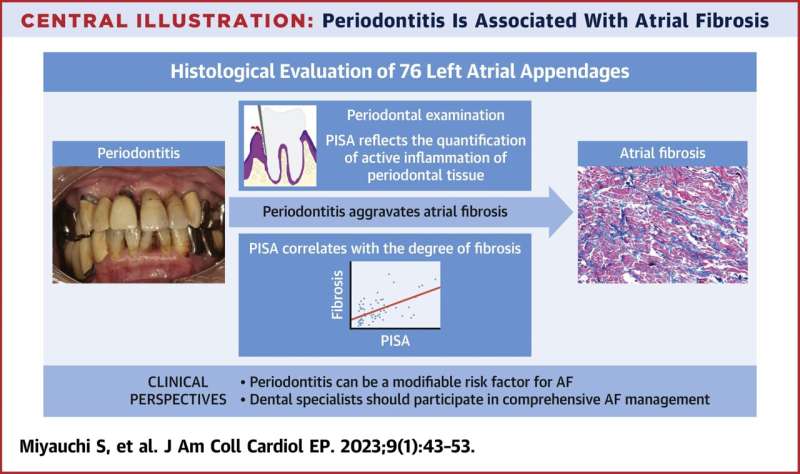This article has been reviewed according to Science X's editorial process and policies. Editors have highlighted the following attributes while ensuring the content's credibility:
fact-checked
trusted source
proofread
Gum infection may be a risk factor for heart arrhythmia, researchers find

Periodontitis, a gum disease, can lead to a litany of dental issues from bad breath to bleeding and lost teeth. Now, researchers at Hiroshima University have found that it could be connected to even more severe problems elsewhere in the body—the heart.
In a study published in JACC: Clinical Electrophysiology, the team found a significant correlation between periodontitis and fibrosis (which is scarring to an appendage of the heart's left atrium that can lead to an irregular heartbeat called atrial fibrillation) in a sample of 76 patients with cardiac disease.
"Periodontitis is associated with a long-standing inflammation, and inflammation plays a key role in atrial fibrosis progression and atrial fibrillation pathogenesis," said first author Shunsuke Miyauchi, assistant professor with the Hiroshima University's Health Service Center. He is also affiliated with the university's Graduate School of Biomedical and Health Sciences. "We hypothesized that periodontitis exacerbates atrial fibrosis. This histological study of left atrial appendages aimed to clarify the relationship between clinical periodontitis status and degree of atrial fibrosis."
The left atrial appendages were surgically removed from the patients, and the researchers analyzed the tissue to establish the correlation between severity of the atrial fibrosis and severity of the gum disease. They found that the worse the periodontitis, the worse the fibrosis, suggesting that the inflammation of gums may intensify inflammation and disease in the heart.
"This study provides basic evidence that periodontitis can aggravate atrial fibrosis and can be a novel modifiable risk factor for atrial fibrillation," said corresponding author Yukiko Nakano, professor of cardiovascular medicine in Hiroshima University's Graduate School of Biomedical and Health Sciences.
According to Nakano, in addition to improving other risk factors such as weight, activity levels, tobacco and alcohol use, periodontal care could aid in comprehensive atrial fibrillation management. However, she cautioned that this study did not establish a causal relationship, meaning that while gum disease and atrial fibrosis degrees of severity appear connected, researchers have not found that one definitively leads to the other.
"Further evidence is required for establishing that periodontitis contributes to the atrial fibrosis in a causal manner and that periodontal care can alter fibrosis," Nakano said. "One of our goals is to confirm that periodontitis is a modifiable risk factor for atrial fibrillation and to promote dental specialists' participation in comprehensive atrial fibrillation management. Periodontitis is an easy modifiable target with lower cost among known atrial fibrillation risk factors. Thus, the achievement of this study series may bring benefits for many people worldwide."
Next, the researchers said they hope to conduct future clinical trials to clarify if periodontal intervention reduces atrial fibrillation occurrence and improves patient outcomes.
More information: Shunsuke Miyauchi et al, Relationship Between Periodontitis and Atrial Fibrosis in Atrial Fibrillation, JACC: Clinical Electrophysiology (2022). DOI: 10.1016/j.jacep.2022.08.018




















